Graham Reid | | 13 min read
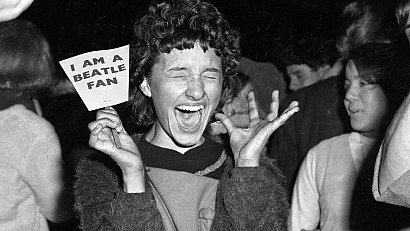
"What a remarkable 50 years they have been for the world . . . think what we would have missed if we had never heard the Beatles"
-- Queen Elizabeth II in a speech in November '97 at a luncheon to mark her golden wedding anniversary.
"If it hadn't been for the Beatles, there wouldn't be anyone like us around" -- Jimmy Page, Led Zeppelin
"The mood was new music. I'd just had five years of top-10 records all over the world, and then in 1963 the Beatles and the Rolling Stones came in and changed popular music. I thought my career was over. I was 23." -- American singer-songwriter Neil Sedaka.
1963 -- THE BEATLES IN BRITAIN
In January the Beatles fly back from their final stint in Hamburg, their second single Please Please Me is released on January 11, they tour supporting Helen Shapiro (as the tour progresses and Please Please Me goes up the charts they become the top billing) and between playing their own dates on February 11 they enter EMI's Abbey Road studio and record 10 songs for their debut album.
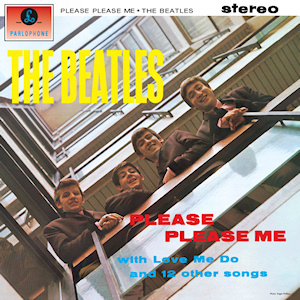 Five days later they appear on the cover of Record Mirror, their first cover on a national music paper.
Five days later they appear on the cover of Record Mirror, their first cover on a national music paper.
They tour constantly, the new single From Me to You tops the UK charts in early May, their debut album Please Please Me (eight of the 14 songs being Lennon-McCartney compositions) is released 10 days later and goes to the top of the charts, they tour constantly and do radio and television.
They are huge in Britain, and the message is going out to the British Empire (Australia, New Zealand and Canada).
Americans are not hearing much or even any of this, their music goes unreleased or apears on very small labels.
Here's the first track off Please Please Me, an original mostly written by McCartney although Lennon dismissed his opening couplet, "She was just 17, neer been a beauty queen" and suggested the one we now hear . . . which is much mre suggestive and open ended.
The count in by McCartney adds urgency and the whole song adopts and adapts various tropes from American rock'n'roll like Chuck Berry, hand-clap Motown soul, Little Richard's "whoooo" and girl gropups ("my heart went boom, when I crossed that room . . .")
I Saw Her Standing There (April 1963)
In July they record She Loves You and I'll Get You, mid July they start work on a second album (to be called With the Beatles on release), in October they record I Want to Hold Your Hand then play in Sweden.
Here is one of the covers on the Please Please Me album, a slice of soft pop by the Shirelles (an American "girl group", there were dozens of them).
Note two things: That they thought nothing of covering songs by girls/women and how it just becomes a Beatles' sound because of the three guitars/drums and male vocals.
Baby, It's You
Baby It's You, the Shirelles
Baby It's You, the Beatles
And listen compare these
Twist and Shout, the Beatles
She Loves You, Aug '63, the new single after the Please Please Me album: a much more sophisticated song. Opening drums announcing it, chorus up front, about a third person, the "whoo" stolen/borrowed from Little Richard, Starr's more complex drum patterns (which previous drummer Pete Best never could have done) . . .
She Loves You
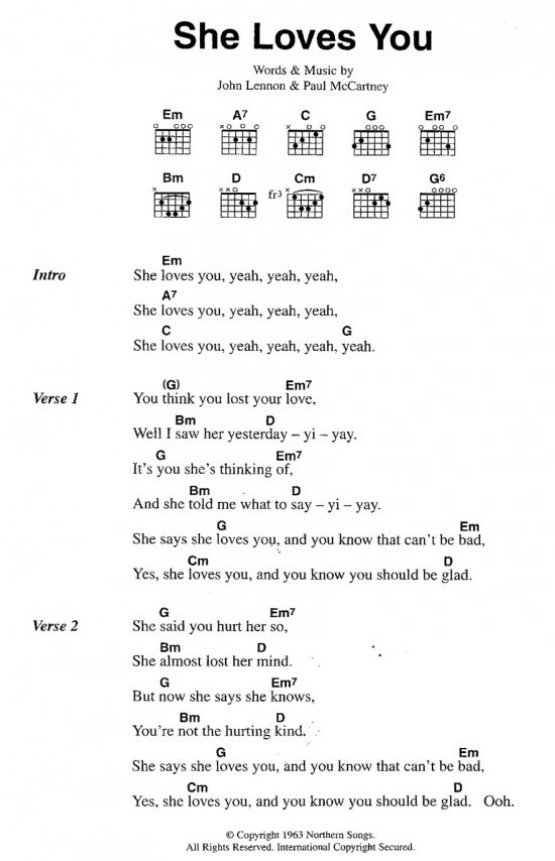
November 64 -- With the Beatles is released. Seven of the 14 songs are by Lennon-McCartney, one is by Harrison.
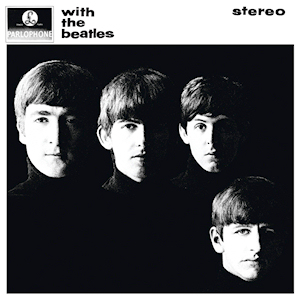 Among the songs they cover are Money (written by Motown founder Berry Gordy), You Really Got a Hold On Me (by Motown's Smokey Robinson), Please Mr Postman by the Marvelettes, Devil in His Heart (by Richard Drapkin and sung by the Donays) and Chuck Berry's Roll Over Beethoven.
Among the songs they cover are Money (written by Motown founder Berry Gordy), You Really Got a Hold On Me (by Motown's Smokey Robinson), Please Mr Postman by the Marvelettes, Devil in His Heart (by Richard Drapkin and sung by the Donays) and Chuck Berry's Roll Over Beethoven.
These are all black American artists so when the Beatles finally made it in the US, Americans heard their own music coming back at them in a pop context of guitars, and a British accent.
Here are the Donays with Devil in His Heart, which was never a hit but somehow the Beatles found the record and learned it.
Devil in His Heart (1962)
And here's the Beatles version. Upbeat, guitar-driven, male voices in harmony, the gender flipped and with George Harrison's Liverpudlian accent making it even more distinctive.
Devil in His Heart (1964)
Here's the original by Smokey Robinson and the Miracles from 1962
You've Really Got a Hold on Me
here's the Beatles' version
You Really Got a Hold on Me by the Beatles, 1964
Here's Barrett Strong's Money (That's What I Want)
and the Beatles version
Money, by the Beatles
but you can go the other way too
Here's another song from With the Beatles, an original
It Won't Be Long written by Lennon-McCartney
and this version recently by the James Hunter Six who take it into a soul direction.
It Won't Be Long, the James Hunter Six
In that treatment you can hear how Lennon and McCartney were intuitively borrowing from the best (Motown, Stax etc) to create their unique upbeat pop.
Meanwhile during this year Cliff Richard was still making nice movies like Summer Holiday (released February 1963) but it was already dated by the time it arrived in cinemas.
BEATLES BY THE NUMBERS
1963: When they appeared on the British television show Sunday Night at the London Palladium in October they were seen by approx 15 million viewers in Britain (almost one third of the population) and newspapers coin the term "Beatlemania".
The following month when they appeared on the televised Royal Command Variety Performance they were seen by around 26 million British viewers.
When they release I Want to Hold Your Hand in November 63 it is the first single to have advance order sales of over one million. By the following month it has sold over three million copies.
In December they become the first act to knock themselves off number one when I Want to Hold Your Hand replaces She Loves You.
THE BEATLES HAVING CONQUERED BRITAIN GO TO AMERICA IN FEBRUARY 1964 ON THE BACK OF THEIR FIRST US HIT I WANT TO HOLD YOUR HAND
1964: In February In their suite at the Hotel George V in Paris, Brian Epstein informs the Beatles that they have secured their first U.S. No. 1 with "I Want to Hold Your Hand."
They fly to the US and are met by 5000 fans at the airport in New York. Two days later when they appear on the Ed Sullivan Show in New York they are seen by approximately 73 million US viewers out of a population of 192 million. A week later they fly to Miami and 4000 fans break down the doors trying to see them.
Tom Petty: “I saw the Beatles on television and I thought I could either be a farmer or I could do that. I wasn't equipped to do anything else. From a very early age I was completely consumed by rock'n'roll.”
Alice Cooper: "I just sat there in my living room in Phoenix with a huge smile on my face."
However . . .
"Visually they are a nightmare: tight, dandified Edwardian beatnik suits and great pudding bowls of hair. Musically they are a near disaster, guitars and drums slamming out a merciless beat that does away with secondary rhythms, harmony and melody. Their lyrics (punctuated with nutty shouts of yeah, yeah, yeah!) are a catastrophe, a preposterous farrago of Valentine-card romantic sentiments." -- Newsweek review of the Beatles on The Ed Sullivan Show.
1964: BEATLEMANIA AND THE BRITISH INVASION*
Ed Sullivan "I have never seen any scenes to compare with the bedlam that was occasioned by their debut. Broadway was jammed with people for almost eight blocks. They screamed, yelled, and stopped traffic. It was indescribable. There has never been anything like it in show business, and the New York City police were very happy it didn't and wouldn't happen again."
February 64 — On the day Meet the Beatles (the retitled UK album with different track listing for the USA, a problem which will mean their US catalogue is very odd) begins an 11-week run at the top of the U.S. album chart.
Billboard magazine reveals that the Beatles have five songs climbing the U.S. Hot Hundred and three LPs on the albums charts.
February 64 — Introducing the Beatles (another US collection) peaks at No. 2 on the U.S. album chart, held off the top only by Meet the Beatles.
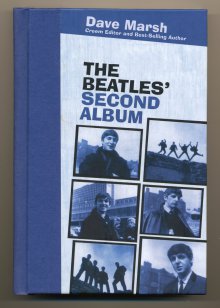 See Dave Marsh's insightful book The Beatles' Second Album here. The album was again a pastiche from UK albums and singles but was very black music covers and rock'n'roll.
See Dave Marsh's insightful book The Beatles' Second Album here. The album was again a pastiche from UK albums and singles but was very black music covers and rock'n'roll.
It wasn't their second album in fact, but the songs (and Marsh's book) explain clearly why an American audience heard their own music coming back at them in a British accent, with guitars. And interestingly McCartney's ballad songs are not on it, and Harrison and Lennon dominate. See the track listing and background here.
Here's the Marvellets with Please Mr Postman (on Motown, 1961)
Here's the Beatles version from '64 (on their UK album With the Beatles and in the US on the Second Album)
March 64 — The Beatles set off from Paddington Station, London, to begin filming their first, as yet untitled, movie which had been planned even before they went to the US.
April 64 — Billboard magazine reports the Beatles now hold the top five positions on the American singles chart, with "Can't Buy Me Love" at No. 1.
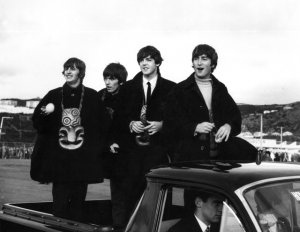 June 64 - They tour to Australia and New Zealand (they get a mayoral welcome in Auckland)
June 64 - They tour to Australia and New Zealand (they get a mayoral welcome in Auckland)
July 64 — The album A Hard Day's Night is released in the U.K. Selling 1.5 million copies in nine days.
It becomes the fastest-selling album in U.K. history.
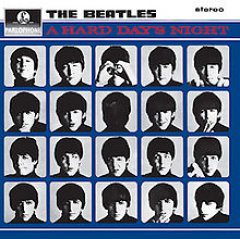
That same month "A Hard Day's Night" hits the No. 1 single slot in the U.K.
The album A Hard Day's Night – on which Lennon-McCartney have written all 14 songs – is simultaneously the U.S. and U.K.'s No. 1 album.
The film opens and Beatlemania is given a further kick along because (unlike Elvis films of the time) A Hard Day's Night is actually exciting, beautifully shot and cleverly edited, and a kind of (black and white) docu-drama of a day in the life of the Beatles.
August 64 — The Beatles reach No. 1 on the U.S. singles chart with "A Hard Day's Night."
George Martin "The song opened the Beatles' first film, and you only have to hear one guitar chord to recognize it. The title came from Ringo. After a particularly strenuous session, he said, "Oh, it's been a hard day." Then he looked at the clock and saw it was midnight. He said, 'It's been a hard day's night.' "
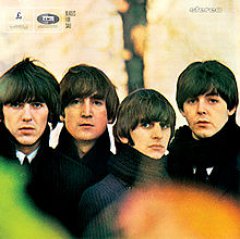 December 64 — The Indonesian government bans Beatle haircuts.
December 64 — The Indonesian government bans Beatle haircuts.
And Beatles for Sale – a weak collection for the Christmas market of new originals and covers dating back to Hamburg and Cavern days – reaches No. 1 in the U.K., displacing A Hard Day's Night.
But the title is cynical and from the looks on their faces Beatlemania is taking its toll. Lennon's contribution Baby's in Black is a dark piece.
Baby's in Black, Dec '64. Beatles for Sale
*THE BRITISH INVASION
"The British are coming!" -- Paul Revere, American patriot during the American Revolutionarty War against Britain (1765-83)
Following the Beatles USA success America went mad for British groups.
The following had considerable success during '64-'65
The Dave Clark Five (DC5): lead by drummer Dave Clark they clocked up numerous chart hits driven by a heavy beat and with sax and organ. (see here). The first British band to break through after the Beatles.
Glad All Over by the Dave Clark Five, 1964
The Animals: Tough blues-based pop-rock behind the raw voice of Eric Burdon. Notable hits were a reworking of the blues song House of the Rising Sun with a lengthy organ part by Alan Price (which allegedly influenced Bob Dylan who had also done the song in a plain folk style)
The Hollies: Close harmony pop with jangling guitars. Notable hits Just One Look (cover of Doris Troy black rhythm and blues song), Look Through Any Window and Bus Stop (written by Graham Gouldman who wrote a number of hits for various Sixties bands)
The Searchers: (also out of Liverpool, also formed as skiffle group like Lennon's Quarry Men): A string of hits (initially all covers) distinguished by their sharp, guitar jangle which influenced the Byrds in the US and subsequently Tom Petty and the Heartbreakers andf the Ramones in the late Seventies.
The Rolling Stones: Positioned as the anti-Beatles in the UK by their manager Andrew Loog Oldham. Early albums and singles mostly blues and rhythm and blues covers (Chuck Berry, Muddy Waters etc) but also notably were offered I Want to Be Your Man by the Beatles as their second single.
I Wanna be Your Man (Beatles)
I Wanna be Your Man (Rolling Stones)
Keith Richards of the Rolling Stones, from his autobiography Life
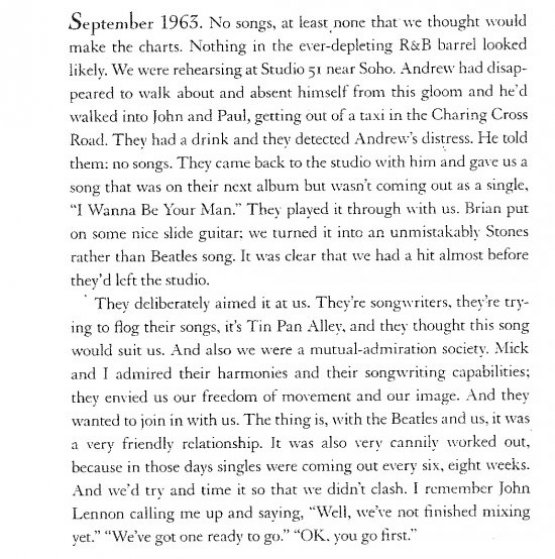
NOTE
Once the Rolling Stones (Mick Jagger and Keith Richards) started writing their own songs they gave the Beatles a real run for their money AND many of their songs were freighted with social and political comment which the Beatles didn't approach.
Consider the following singles from '65-'67
Play with Fire (the B-side of The Last Time) which mentions class divisions being eroded
Satisfaction (sexual comment, an attack on commercialism/consumerism also)
Get Off Of My Cloud (consumerism again)
19th Nervous Breakdown (again class by implication)
Paint It, Black (melancholy, nihilistic gloom)
Mother's Little Helper (about over the counter and prescription pills cf by implication marijuana)
Let's Spent the Night Together (overt sex)
AND
on albums they addressed the music industry quite cynically (Under Assistant West Coast Promo Man), Jagger came off as brutally misogynistic (Under My Thumb), they sang of class/sex (Back Street Girl) and sex with older women/fans/wealthy older women slumming it with rock stars (Spider and the Fly, later on again on Honky Tonk Womem), drugs (Something Happened to Me Yesterday) and more.
Other notable British Invasion artists were
Gerry and the Pacemakers (from Liverpool, managed by Brian Epstein and produced by George Martin) who recorded the song the Beatles rejected as their first single in favour of their own Love Me Do.
and this from '65
They also made movie in '65 -- a lesser Hard Day's Night in most respects -- which had scenes shot in the Cavern and featured Cilla Black and others from the Liverpool scene.
Also: Billy J Kramer and the Dakotas (managed by Epstein, covers of Beatles songs including Bad to Me which the Beatles never recorded), Lulu (little Scottish belter) and groups like the Who (not really big in the US until later in the decade), Manfred Mann (a group), the Yardbirds and the Kinks (banned from the US for four years) who were known to US audiences by their recordings more than concert or television appearances.
The Kinks first single was Long Tall Sally, a Little Richard song which the Beatles and others had as a staple of their live shows.
then these: You Really Got Me (Aug 64) and All Day and All of the Night (Oct '64)
Herman's Hermits: cute pop, mostly covers (even a British music hall song I'm Henry the Eighth), hugely successful. Made films, broke through in '65 as the Beatles were rapidly moving on from teen-scream audiences.
There were also any number of one-hit wonders like Chad and Jeremy and Peter and Gordon (who recorded some McCartney songs, like this).
And why so many young men making music or getting into fashion and art?
Until 1960 young men aged 18 were taken in to National Service (compulsory military training, aka the draft in the USA) and now that wasn't happening. It was announced in 1957 that it would be scrapped and it was three years later.
"Growing up in a post-war England era spurred us on. We'd heard enough about the war which was all grown-ups seemed to talk about. We wanted to get out of this war mind-set. We'd all grown up facing the draft. I was thinking, 'I just wanna get out of the god-damned house. I don't want to go in the army.
"It was dopey. Conscription had ended a couple of years before in 1960. We were all facing this new space and suddenly we didn't have to do that. Your whole life you'd heard, 'When you're 18 you'll be in the army and that will sort you out.'
"Suddenly this miracle happened and we didn't have to do the draft. And you are 17 or 18 and you just have all that testosterone and tis amzing spare free time. Woo-hoo!"
-- Rolling Stone Keith Richards
and at the same time young women began expressing themselves, starting fashion lables (like BIba),m becoming models, hair stylists . . . and pop singers
And the likes of Lulu (here singing a Ray Charles song)
Cilla Black from Liverpool
and Dusty Springfield (one of the great white soul singers as she would prove with her album Dusty in Memphis in '69)
from late 1963
and a bit later ('67)
The British Invasion is driven by singles. And pop was dominant. And in Britain the pre-war class barriers had been eroded in the struggle to survive the conflict, and after the war the working class became fashionable. Actors like Michael Caine emerged (with a thick Cockney accent) and of course so many of the pop singers and groups.
All around the world groups formed in the Beatles' mould, from the Buckinghams in Chicago to Ray Columbus and the Invaders in New Zealand. Musicians fell hard for the sound of British pop and covered it or copied it.

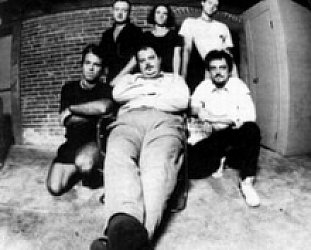
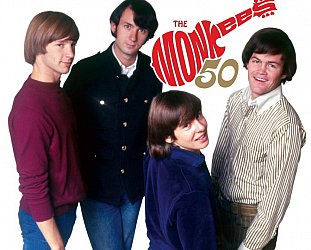
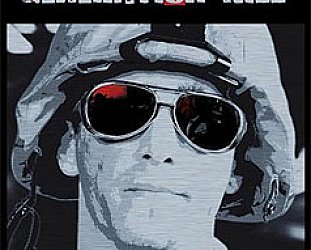
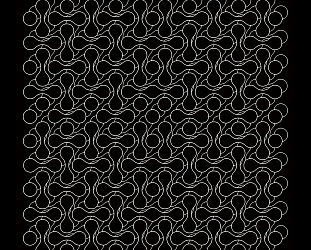
post a comment